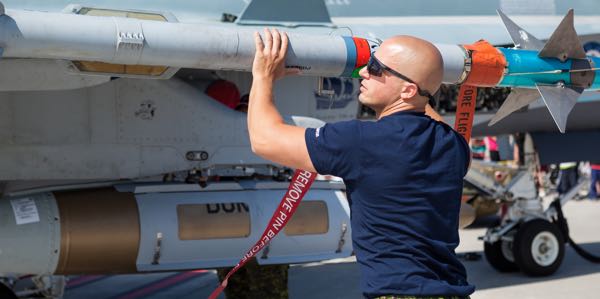What is an Air Weapons Specialist?
Do you have interest in working with guns and explosives? You might want to consider this interesting career.
Air weapons specialists store, service, inspect, and handle all types of aerial weapons, ammunition, and launchers. Ammunition includes rockets, missiles, and torpedoes, and can vary from small arms ammunition to nuclear weapons.
Air weapons specialists might also deal with systems not related to weapons such as aircraft fire extinguishing systems and ejection seats. With further training, they can qualify as a demolition operator, and it is possible to specialize even further to handle improvised explosive devices.
What does an Air Weapons Specialist do?
An air weapons specialist specializes in one kind of weapon, and it can cost thousands of dollars to train an individual. Most weapons have electronic components to locate targets, then aim and fire the weapon. Specialized knowledge is required to operate technical equipment, figure out complicated problems, and provide and interpret information.

Air weapons specialists that work with nuclear weapons need steady nerves and a lot of mental discipline, as they work not only with delicate materials, but with the part of a nation's defence that simply cannot be allowed to fail. Air weapons specialists receive advanced training and their weapons take the form of gravity bombs, cruise missiles, and multiple warhead ICBMs.
Air weapons specialists must often interact with other specialists, officers, aircrew members, and civilian staff. A strong team-based culture results from the nature of their work. They are one of the few specialties of the U.S. Navy to have their own association, the Association of Aviation Ordnancemen.
In carrying out their duties, an air weapons specialist may also come across classified materials which makes their work very sensitive.
What is the workplace of an Air Weapons Specialist like?
Air weapons specialists sometimes work in hangars and workshops, but often, work is outdoors (naval air weapons specialists work at sea). Heavy objects may have to be lifted or carried, and light or heavy tools operated.
The work at times takes place in cramped, confined, or otherwise awkward positions. The light may be poor, and the environment may be noisy.
Before embarking on this career, a candidate needs to understand that serious injury or death can occur due to explosives, electricity, toxic materials, radiation, and cryogenic liquids. Accidents can be costly, so care must constantly be taken. Personal protective garments are provided as necessary, and their use is always enforced.
Air Weapons Specialists are also known as:
Aerial Weapons Specialist